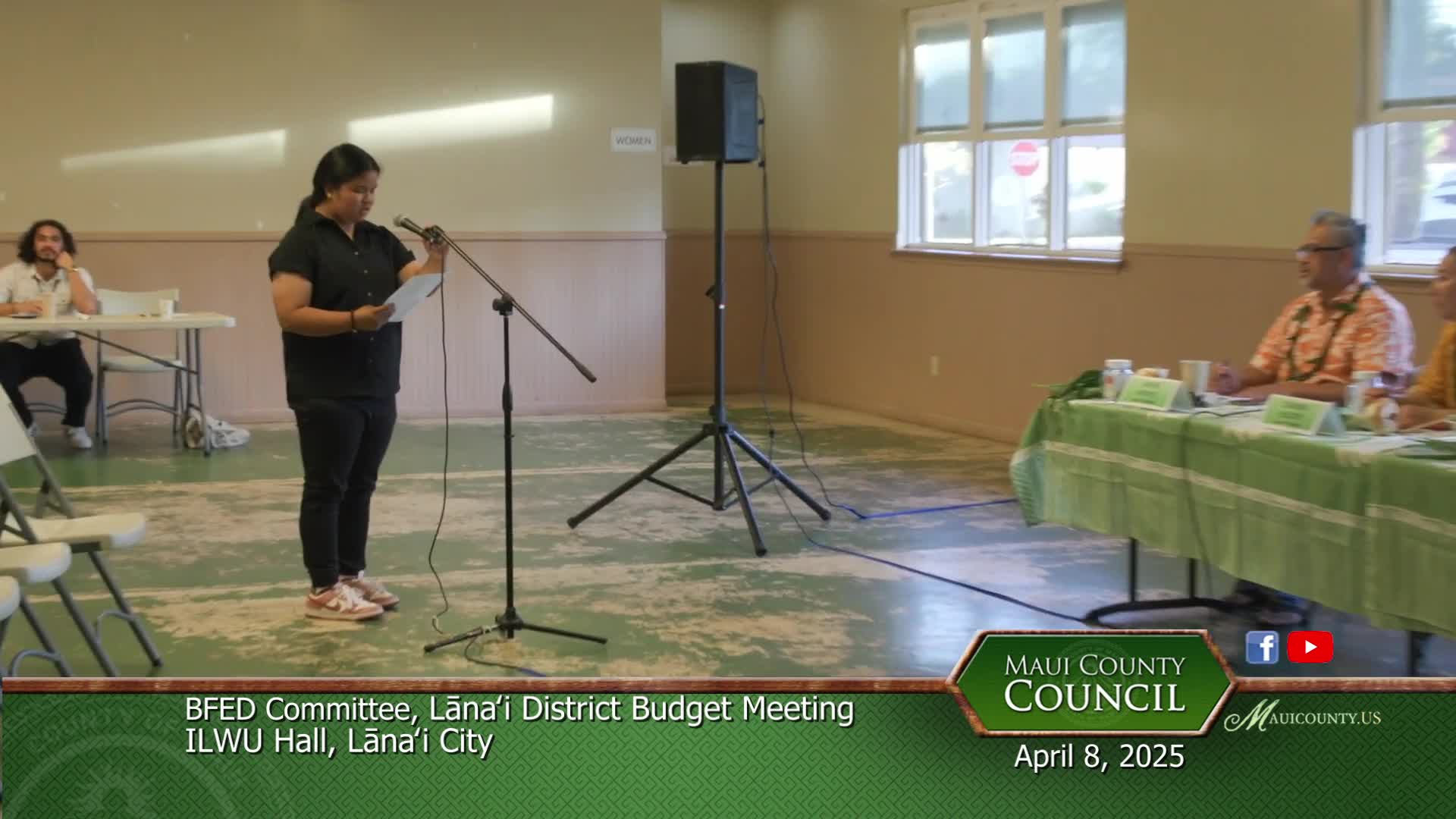Lanai residents urge funding in Bill 41 for Filipino cultural programs, youth travel, food security and stewardship
Get AI-powered insights, summaries, and transcripts
Subscribe
Summary
Lanai residents urged the Maui County Budget, Finance and Economic Development Committee on Monday to preserve and expand elements of the mayor's proposed fiscal year 2026 budget (Bill 41) that target cultural programming, youth travel, food-security projects and land stewardship.
Lanai residents urged the Maui County Budget, Finance and Economic Development Committee on Monday to preserve and expand elements of the mayor's proposed fiscal year 2026 budget (Bill 41) that target cultural programming, youth travel, food-security projects and land stewardship.
Testimony centered on the Lanai Economic Development and Cultural Program and requests that it fund the Lanai Filipino Community Coalition (LFCC), support student travel and activities, continue county transportation and home-health services, and sustain the Lanai Culture and Heritage Center's hunting-based stewardship program.
Supporters said the investments help preserve culture and deliver services to residents. "Supporting LFCC is supporting students like me, giving us a chance to connect with our roots and to share that proudly with others," said Princess Faye, a Lanai High and Elementary School freshman who testified about the school's new Filipino 1 class. Multiple students and J-1 teachers described classroom projects, performances and off-island events that they said grew from the class.
Kathleen Castallas, identified as the treasurer of LFCC, asked the committee for $40,000 from the Lanai Economic Development and Cultural Program to fund cultural events and programs and to finance an in-person grant workshop by the Office of Economic Development to improve Lanai applicants' access to county grants. "Specifically, we are asking for 40,000 in funding to help with our upcoming cultural events and programs," Castallas said.
Other funding requests included $52,000 from Ashley Richardson, vice president of Lanai Community Association, to support the Pineapple Festival and new children's activities there; multiple witnesses urged maintenance of youth travel funds so school teams, clubs and coaches can attend off-island tournaments and conferences.
Community organizations and businesses described broader benefits they said rely on Bill 41 allocations. Michelle Winehouse, owner of Kapuz Farm Lanai, credited Maui Economic Development Board (MEDB) STEM Works and related ag programs supported in the budget with helping build local farm businesses and youth internships, and asked the committee to continue those grants.
Local public services also featured in testimony. Rose Jane Anchetta, branch manager for Lanai MEO, asked the council to continue transportation funding that she said serves kupuna and dialysis patients. Dr. John Janakowski, a local physician, urged continued support for Lanai home-health services, saying staff shortages have produced waiting lists for home health care.
Land stewardship and deer management were raised by Shelly Kaiaokamale, executive director of the Lanai Culture and Heritage Center. The nonprofit runs a community stewardship program funded in part by the National Fish and Wildlife Foundation that opens resident hunting as a tool for invasive-ungulate control on Lanai's eastern side. "We removed over 3,400 invasive ungulates," Shelly Kaiaokamale said, and the program, she said, engages local hunters and provides meat to kupuna while supporting restoration work.
Advocates asked the committee to consider whether county deer-management funds that are currently directed to farmers and ranchers might also be available to community stewardship programs. Shelly and other witnesses noted the stewardship project has been supported largely by external grants and expressed concern about federal funding uncertainties.
Youth programs and STEM funding drew personal appeals. Adam Purdy, a 2019 Lanai High graduate and director with the Lanai Academy of Performing Arts, credited MEDB STEM Works with his path to becoming a licensed drone operator and warned against cuts: "If STEM Works gets cut, it's not just trimming a budget line. It's stripping away pipelines for Lanai's innovation, growth, and inspiration," he said.
Several speakers raised operational and access issues: Mary Lou Calcayano and other youth-sports volunteers said local teams regularly pay travel costs up front to play on Maui and would benefit from easier access to county grants and travel funds; Mary Lou said, "we're putting out the money, but we're not getting it back," describing the burden of paying expenses before grant reimbursement.
Multiple witnesses described the LFCC's recent organization, its Filipino clubhouse (described as a commercial kitchen used for community events) and its work to restart cultural festivals and youth exchanges. Noemi Barbadillo, LFCC president, told the committee the group is seeking county support to restore events and send youth to programs that foster cultural pride: "Reviving the LFCC is my way of honoring that legacy," she said.
Committee members did not make final decisions during the testimony period. Witnesses from schools, nonprofits, businesses and volunteer groups closed by urging the council to preserve or increase targeted allocations in Bill 41 so the programs can continue.
Looking ahead, several testifiers asked the committee to consider technical support: in-person grant workshops on Lanai to increase local success in competitive grant programs, and clearer eligibility for county deer-management funds to recognize community stewardship projects.
The committee's next steps on Bill 41 were not announced during the Lanai public testimony session.
